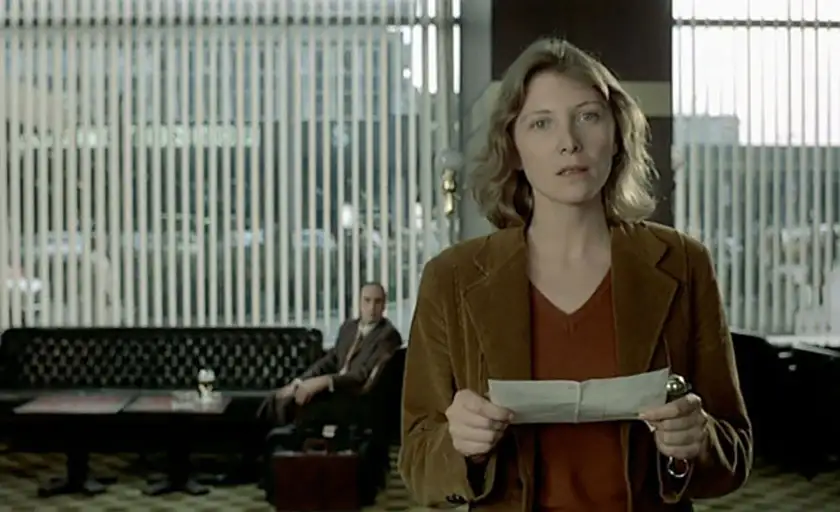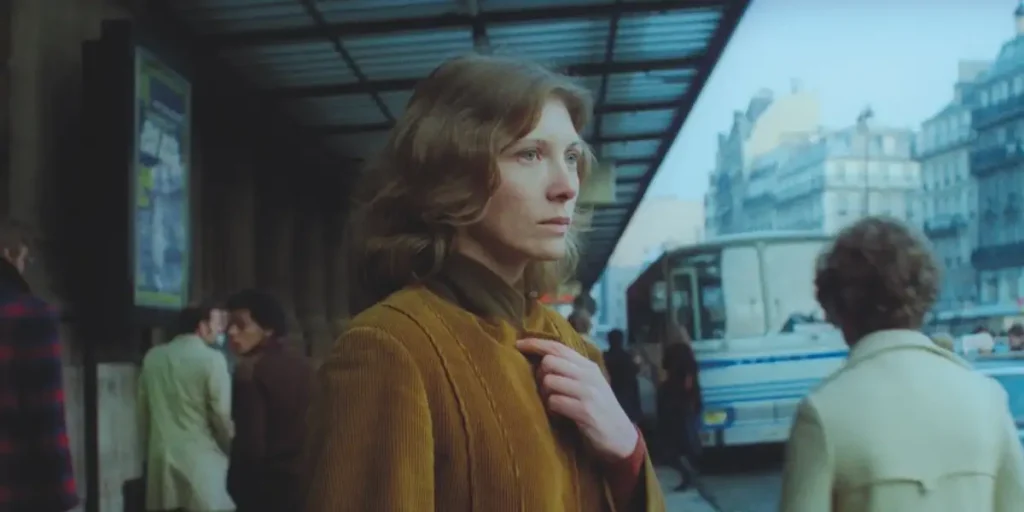In Les Rendez-vous d’Anna, Chantal Akerman’s unmistakable style of static camerawork, striking observation, and transfixing character work is on full show to hypnotic effect.
Director: Chantal Akerman
Genre: Drama
Run Time: 128′
Original Release: November 8, 1978
Restoration Release: February 7-21, 2025
Where to Watch: At the BFI Southbank and in select venues across the UK, and on Blu-Ray from 24 February
Chantal Akerman knew how to work with and observe occupied and empty spaces. Whether it’s the confined apartment of Jeanne Dielman, 23 quai de Commerce, 1080 Bruxelles (1975), the ripe arena of Golden Eighties (1986), or the wider but no less suffocating scope of Les Rendez-vous d’Anna (1978), the late filmmaker consistently showed a propensity for observing humans in such places. The latter—a painful portrait of a lonely woman floating through the contemporary world—starts with a static shot of an empty train station platform, before jostling bodies of commuters flood the screen, followed by emptiness again.
Only Anna (Aurore Clément, Paris, Texas) remains; in around five minutes, Akerman has set the scene for one of her most impressive films.
Anna is a successful filmmaker, and we follow her throughout a series of European cities that she visits for various promotional events. Along the way, she meets old acquaintances and new strangers, and via Akerman’s penetrative character study, we see a notable detachment in Anna from the world. Les Rendez-vous d’Anna has the same austerity and ensuing loneliness as Jeanne Dielman, but it is also markedly different. Where Akerman’s most famous film creates much of its power through non-verbal ways, Les Rendez-vous d’Anna, whilst still crafting mighty emotions through silence, bleeds feelings through complex and striking dialogue. This film might be as claustrophobic as Jeanne Dielman, but its setting and array of experiences and characters are wider.
Les Rendez-vous d’Anna is made of largely static, sumptuously composed shots that glow and ache with symbolism. Jean Penzer’s exquisite cinematography is a highlight of this film. With Akerman, he conjures up countless memorable shots: Anna’s rigid body looking longingly at the world passing her by; in a hotel room, Anna lies on one bed whilst a second sits empty, pointedly framed to enhance the film’s emptiness; wide shots enhance and stretch the growing distance and isolation that Anna experiences. At the centre of these shots is Clément, who is brilliant as a woman of both power and pain.

It is also notable that Anna being alone isn’t always portrayed as negative. We see her enjoy the company of others and being on her own. Akerman also doesn’t put Anna’s loneliness down to her not having a husband, as many filmmakers would and as one character suggests; Anna doesn’t need a man and if she did, it wouldn’t solve her problems. Akerman deliberately leaves parts of Anna’s past ambiguous: she was almost married twice, and might have had two children, but the time was wrong. Les Rendez-vous d’Anna is also a striking LGBTQ+ text, with a scene where Anna describes a sexual experience with a woman particularly striking, the titular character flitting from erotic liberation to suppressed sexuality.
Some parts of Les Rendez-vous d’Anna feel slightly aimless or overly long, but for the most part, Akerman’s film, which came just three years after Jeanne Dielman, is a mesmerising, carefully considered portrait of loneliness and identity. It is a film with so many layers that each viewing will present different analogies and feelings, both via its strong visual identity and complex screenplay. Les Rendez-vous d’Anna is Akerman at her best: observational cinema that can be both incredibly painful and breathtakingly beautiful in the space of just a few minutes.
Les Rendez-vous d’Anna: Movie Plot & Recap
Synopsis:
Over the course of the film, we follow Anna, an accomplished filmmaker, as she visits various European cities and meets a variety of friends, family, and strangers. Details of her life are carefully filled in and alluded to, as her social isolation and pained emotions come to the fore.
Pros:
- Mesmerising and meticulous cinematography of deep symbolism
- A wonderfully restrained central performance by Aurore Clément
Cons:
- Some parts are unnecessarily long
A 4K restoration of Golden Eighties will be screened at the BFI Southbank on 7-21 February, 2025 as part of a near complete retrospective season of Chantal Akerman’s films, ‘Chantal Akerman: Adventures in Perception’, throughout February and March. The film will also be in a UK cinema touring package of Akerman titles at venues across the UK, including Ciné Lumière, Institute of Contemporary Arts (ICA) and Glasgow Film Theatre.
Les Rendez-vous d’Anna will also feature on the BFI Blu-ray Chantal Akerman Collection: Volume 1— 1967 – 1978 , released on 24 February.

